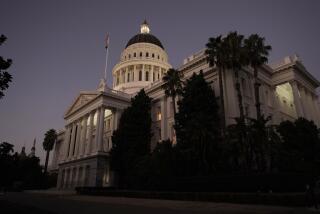Amazon’s offer in California sales tax fight gets tepid response
Gov. Jerry Brown and the state’s two top legislative leaders are showing little enthusiasm for an offer by Amazon.com Inc. to hire as many as 7,000 workers if the state would delay efforts until 2014 to force all online retailers to collect California sales taxes.
Brown did not dismiss the Amazon bid out of hand Thursday. But the governor said he was worried about losing hundreds of millions of dollars in sales taxes from Amazon and other Internet sellers based out of state under a new law requiring them to collect the money.
“I’m concerned about anything that would reduce revenues going forward because we’re in a very uncertain economy,” Brown said after attending an awards ceremony for correctional officers in Sacramento. “We need more revenues unless we’re going to keep curbing schools, courts, corrections.”
Amazon so far has refused to collect taxes on purchases made by California customers. Instead the Seattle company has contributed more than $5 million to a referendum campaign to try to repeal the new sales tax collection law.
Amazon declined to comment on its new offer or the preliminary talks it held with legislative staff and representatives of California big-box retailers.
Supporters of the new law, led by the California Retailers Assn., argued that unfair competition from Amazon and other companies that do not collect sales taxes has cost California about 18,000 jobs.
In a counter measure, Democrats last week came up with a parliamentary maneuver that, if successful, would nullify the referendum. It involves passing another bill that would contain all the elements of the current law but would not be subject to a referendum.
To make that plan work, Democrats would need to win a two-thirds vote of the members of both houses by persuading a handful of generally anti-tax Republicans to vote for the new bill, AB 155.
For now, top Democratic lawmakers said they were not interested in cutting a new deal with Amazon, focusing instead on passing AB 155 in the last few days of the legislative session, which is scheduled to end Sept. 9.
“The Amazon proposal in my view is interesting, but 155 is more interesting because it upholds the law and guarantees that the state will be able to collect the sales tax from Amazon over the next two fiscal years,” Senate President Pro Tem Darrell Steinberg (D-Sacramento) said.
Not collecting the sales taxes on purchases from Amazon turns California taxpayers into “tax cheats,” Assembly Speaker John Perez (D-Los Angeles) said.
The Democrats’ reluctance to compromise with Amazon is not realistic, said George Runner, a conservative Republican and a member of the Board of Equalization, the state’s sales tax collection agency. Since the Internet sales tax collection law took effect two months ago, neither Amazon nor any other out-of-state Internet seller has filed for an official permit to collect sales taxes in California, Runner said.
“Clearly, there is no revenue” from the new law, Runner said. “To me, the compromise position has more potential revenue attached to it than the current law.”
Separately, Board of Equalization member Betty Yee said she had been asking Wal-Mart Stores Inc. why some affiliated companies that sell their products on Wal-Mart.com don’t collect sales taxes on California purchases.
The Times reported this week that CSN Stores of Boston sells hundreds of sometimes high-priced products on Wal-Mart.com, an operation based in California, but does not collect the sales tax.
Wal-Mart, a major player in the campaign to make Internet sellers collect sales taxes, said it left the decision on sales taxes up to CSN and other so-called marketplace partners.
Such collections, though, appear to be required under California’s new law, Yee said.
Wal-Mart agreed to help the board “in reaching out to these partners to assist them in understanding their obligations under California’s e-fairness law,” Yee said in a statement.
The law, she said, “is about leveling the playing field so that any business can compete on fair and equal terms.”
More to Read
Inside the business of entertainment
The Wide Shot brings you news, analysis and insights on everything from streaming wars to production — and what it all means for the future.
You may occasionally receive promotional content from the Los Angeles Times.











